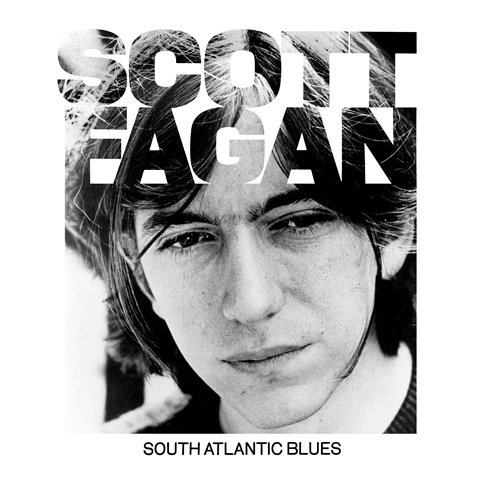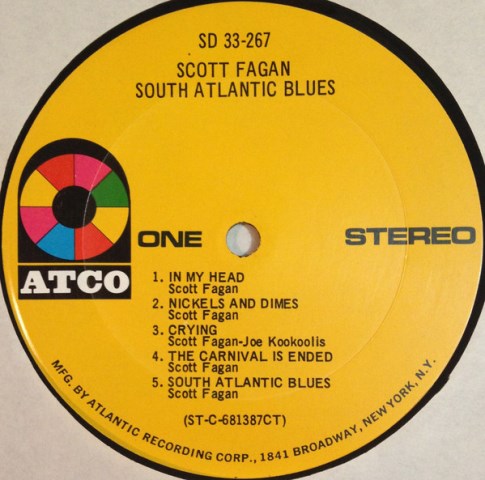Music Reissues Weekly: Scott Fagan - South Atlantic Blues | reviews, news & interviews
Music Reissues Weekly: Scott Fagan - South Atlantic Blues
Music Reissues Weekly: Scott Fagan - South Atlantic Blues
Distinctive, soul-inclined album from 1968 gains another chance to find an audience

The album opens with “In my Head.” The lead instrument is an electric piano, over which a quavering, clenched voice sings. The closest comparison is Pearls Before Swine’s Tom Rapp, a similarly idiosyncratic singer. As the stately song unfolds, stabbing strings complement interjections from a soul-styled brass section.
Melodically, “In my Head” has a resemblance to “Piece of My Heart," which Erma Franklin issued as single in 1967 and Janis Joplin thenceforth made her own. The intimations of soul music point to one aspect of where South Atlantic Blues is coming from, but Scott Fagan’s first album is as particular as his voice. A form of singer-songwriter album, it evades genre classification. On Side Two, “Tenement Hall” begins along southern soul lines. Then, that voice arrives – as offbeat as before, but deeper. The singing gets increasingly intense as Fagan shrieks “this is insane, no life at all, to live in the shadows of a tenement hall” before the song breaks down at its mid-point into a free-jazz freak-out dominated by an atonal violin. After this, back to the song. It ends with the repeated, echo-drenched declaration of the word “insane.”
 South Atlantic Blues was issued November 1968. Original stereo pressings aren’t rare, and can be picked up in OK shape for little-more than £20. The promotional-only mono version is harder to find but still fairly cheap at about £30 or £40. South Atlantic Blues was last reissued on CD and vinyl in 2015, and this new LP edition (the text by Fagan is carried-over from the 2015 release - newly commissioned liner notes would have been nice) of an album with cult item written all over it is welcome.
South Atlantic Blues was issued November 1968. Original stereo pressings aren’t rare, and can be picked up in OK shape for little-more than £20. The promotional-only mono version is harder to find but still fairly cheap at about £30 or £40. South Atlantic Blues was last reissued on CD and vinyl in 2015, and this new LP edition (the text by Fagan is carried-over from the 2015 release - newly commissioned liner notes would have been nice) of an album with cult item written all over it is welcome.
Fagan’s debut album was issued by the ATCO label, whose hot band at the time it came out was Vanilla Fudge. The previous year, Buffalo Springfield and Sonny & Cher had been their big hitters. Mostly, ATCO was concerned with jazz and soul. Otis Redding was on their books. Oddity that it is, South Atlantic Blues sounds like the sort of thing the Elektra or Straight labels would have released. Fagan’s route to ATCO was through Mort Shuman, the songwriter-producer who, with Doc Pomus, was behind hits by Elvis Presley and The Drifters. When South Atlantic Blues was released, Shuman was riding high as a result of his Jacques Brel Is Alive and Well and Living in Paris stage show.
Born in New York City in 1945, Fagan grew up on the Caribbean island of Saint Thomas. His mother, who took him there, had been a dancer and jazz singer. He returned to New York in 1964 and began playing Greenwich Village. His songwriting attracted the attention of Shuman, with whom he co-wrote the fabulous 1965 Irma Thomas single “I'm Gonna Cry Till My Tears Run Dry.” Fagan himself released a 1966 single on the Bang label: which also issued Erma Franklin’s “Piece of My Heart" the next year – given what his “In my Head” sounds like, Fagan was presumably paying attention to the label’s catalogue. In 1967, Guy Darrell issued a single of Fagan’s song “Crystal Ball,” which cropped up on South Atlantic Blues. Fagan, it seemed, was beginning to carve a path as a songwriter for others.
However, in Spring 1968, Verve announced they had signed him. But he ended up in record shops on ATCO. Curiously, before his album was issued, a September 1968 ATCO test pressing teamed tracks from South Atlantic Blues with cuts by Max Roach. If this was for marketing purposes, it suggests ATCO were aiming Fagan at jazz audiences.
 South Atlantic Blues wasn’t a seller, but judging by the amount of original albums around a fair amount were pressed. Despite its low sales, the music business did not give up on Fagan and a couple of singles on Epic were released in 1969. The next year, he co-wrote the rock musical Soon. When it opened on Broadway in January 1971, Richard Gere was amongst its cast. It cast a jaundiced eye over Fagan’s brushes with the music biz and ran for just three performances. Fagan next resurfaced in 1975 on RCA with his second album. A year earlier, his song “Everybody Loves a Winner” had been recorded for RCA by disco/soul outfit The Brothers.
South Atlantic Blues wasn’t a seller, but judging by the amount of original albums around a fair amount were pressed. Despite its low sales, the music business did not give up on Fagan and a couple of singles on Epic were released in 1969. The next year, he co-wrote the rock musical Soon. When it opened on Broadway in January 1971, Richard Gere was amongst its cast. It cast a jaundiced eye over Fagan’s brushes with the music biz and ran for just three performances. Fagan next resurfaced in 1975 on RCA with his second album. A year earlier, his song “Everybody Loves a Winner” had been recorded for RCA by disco/soul outfit The Brothers.
And that was pretty much it until the end of the Nineties when collectors digging through Sixties obscurities found South Atlantic Blues and rediscovered its particular brilliance. There was another postscript. Stephin Merritt, who records as Magnetic Fields, learned in his mid-teens that he was Fagan’s son, a relationship his father knew nothing about. They first met in 2013. The musical genes had been passed on.
Back in November 1968, US trade paper Billboard reviewed South Atlantic Blues, saying (in full), “Singer-guitarist-composer Scott Fagan stars on his first LP, a unique blend of folk-blues, lyrically fresh and unheard of. A native of the Virgin Islands, Fagan plays and sings Shanty blues [sic], roaming freely through “South Atlantic Blues,” "Nothing But Love” and “Tenement Hall.” Fagan’s special readings could shake up the charts with the impact of a down and dixie Dylan.” Unfortunately, despite this thumbs up, the charts were not shaken up. Perhaps, now, the great South Atlantic Blues will find the audience it deserves.
- Next week: Gypsy Bells - Columbia Recordings 1967 - extraordinary Lou Christie collection
- More reissue reviews on theartsdesk
- Kieron Tyler’s website
Explore topics
Share this article
more New music
 Music Reissues Weekly: Warsaw - Middlesbrough 14th September 1977, Joy Division - Manchester 28th September 1979
Thrilling live document of one of Britain’s greatest bands
Music Reissues Weekly: Warsaw - Middlesbrough 14th September 1977, Joy Division - Manchester 28th September 1979
Thrilling live document of one of Britain’s greatest bands
 Album: Justice - Hyperdrama
French electronic dance stalwarts return from eight-year break in fine fettle
Album: Justice - Hyperdrama
French electronic dance stalwarts return from eight-year break in fine fettle
 Album: St Vincent - All Born Screaming
Annie Clark transcends indie’s average leanings
Album: St Vincent - All Born Screaming
Annie Clark transcends indie’s average leanings
 Album: Pet Shop Boys - Nonetheless
Longing, love and longevity as the duo resolutely refuse retirement
Album: Pet Shop Boys - Nonetheless
Longing, love and longevity as the duo resolutely refuse retirement
 Album: Mdou Moctar - Funeral for Justice
Tuareg rockers are on fiery form
Album: Mdou Moctar - Funeral for Justice
Tuareg rockers are on fiery form
 Album: Fred Hersch - Silent, Listening
A 'nocturnal' album - or is it just plain dark?
Album: Fred Hersch - Silent, Listening
A 'nocturnal' album - or is it just plain dark?
 Music Reissues Weekly: Linda Smith - I So Liked Spring, Nothing Else Matters
The reappearance of two obscure - and great - albums by the American musical auteur
Music Reissues Weekly: Linda Smith - I So Liked Spring, Nothing Else Matters
The reappearance of two obscure - and great - albums by the American musical auteur
 The Songs of Joni Mitchell, Roundhouse review - fans (old and new) toast to an icon of our age
A stellar line up of artists reimagine some of Mitchell’s most magnificent works
The Songs of Joni Mitchell, Roundhouse review - fans (old and new) toast to an icon of our age
A stellar line up of artists reimagine some of Mitchell’s most magnificent works
 Album: Taylor Swift - The Tortured Poets Department: The Anthology
Taylor Swift bares her soul with a 31-track double album
Album: Taylor Swift - The Tortured Poets Department: The Anthology
Taylor Swift bares her soul with a 31-track double album
 Album: Jonny Drop • Andrew Ashong - The Puzzle Dust
Bottled sunshine from a Brit soul-jazz team-up
Album: Jonny Drop • Andrew Ashong - The Puzzle Dust
Bottled sunshine from a Brit soul-jazz team-up
 theartsdesk on Vinyl: Record Store Day Special 2024
Annual edition checking out records exclusively available on this year's Record Store Day
theartsdesk on Vinyl: Record Store Day Special 2024
Annual edition checking out records exclusively available on this year's Record Store Day
 Album: Pearl Jam - Dark Matter
Enduring grunge icons return full of energy, arguably their most empowered yet
Album: Pearl Jam - Dark Matter
Enduring grunge icons return full of energy, arguably their most empowered yet

Add comment